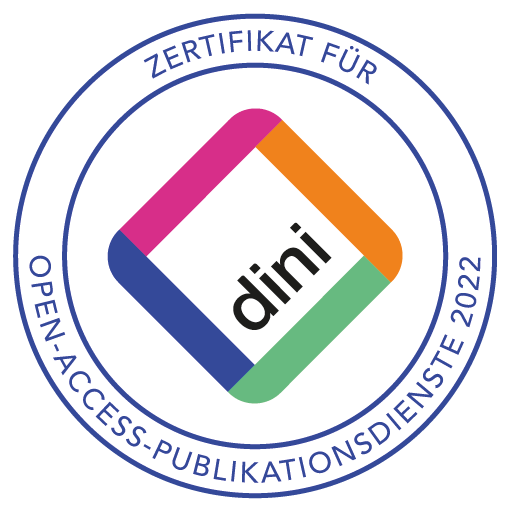Oral History
Refine
Year of publication
Document Type
- Online Publication (36)
- Journal Article (11)
Keywords
- Deutschland (DDR) (1)
- Dokumentationseinrichtung (1)
- Freimark, Gisela (1)
- Freimark, Hans Peter (1)
- Historisches Museum (1)
- Interview (1)
- Perleberg (1)
Im Jahr 2006 eröffnet, bietet das DDR-Geschichtsmuseum im Dokumentationszentrum in der brandenburgischen Kleinstadt Perleberg eine Fülle an Anschauungsmaterial aus und über das Leben in der DDR. Das Pfarrerehepaar Gisela und Hans-Peter Freimark begann bereits in den 1980er-Jahren damit, Objekte zu sammeln, die das politische System aber auch den Alltag der DDR dokumentieren sollen. Insbesondere das oppositionelle Engagement der Freimarks, die sich als Pfarrer und Gemeindehelferin in der DDR entschieden für Frieden und Abrüstung einsetzten und sich somit der SED widersetzten, ist mit zahlreichen Fotos und Gegenständen in der Ausstellung dargestellt.
Vier Studierende der Public History der Freien Universität Berlin und ein zweiköpfiges Filmteam der Technischen Hochschule Ostwestfalen-Lippe digitalisierten und bewahrten in einem Dokumentations- und Interviewprojekt das Wissen über die Ausstellung des DDR-Geschichtsmuseums in Perleberg.
Insbesondere die Biografie des Pfarrerehepaars Hans-Peter und Gisela Freimark, die die Ausstellung initiierten und bis heute leiten, stand im Mittelpunkt dieses Projektes. Die Projektgruppe wurde von Irmgard Zündorf vom Leibniz-Zentrum für Zeithistorische Forschung unterstützt. Gefördert wurde das Projekt durch die Beauftragte des Landes Brandenburg zur Aufarbeitung der Folgen der kommunistischen Diktatur. Im Verlauf der Monate März und April 2020 fanden die Interview- und Dreharbeiten in Perleberg statt. Ziel des Projekts ist die Entwicklung einer digitalisierten Führung durch das Museum. Teil II des Projektes befindet sich derzeit in der Realisierung.
»There is nothing new or eccentric about the suggestion that historians might profit from an acquaintance with anthropology«, schrieb der britische Sozial- und Kulturhistoriker Keith Thomas 1963. Er bezog sich damit seinerseits auf Debatten der 1930er-Jahre, die von dem Wirtschafts- und Sozialhistoriker Richard Henry Tawney angeregt worden waren, der damals an der London School of Economics wirkte. Thomas fügte jedoch sogleich hinzu, dass der Vorschlag einer engeren Verbindung von Geschichte und Anthropologie selten in die Praxis umgesetzt werde.
Oral history has been enriching the theoretical and methodological debates of German-language contemporary history research for over forty years. While early skepticism towards oral history has long since given way to its broad (and sometimes uncritical) acceptance and application, there is still much debate about what exactly it is as both a method and a research field, and what value for historiography – and as source material – it has. In our contribution to the debate, we explore how oral history has developed over time, which international and interdisciplinary influences have proven significant, its underlying theoretical and methodological concepts, and which factors might shape its future.
Kämpfe um Rückführungen prägen das europäische Grenzregime des 21. Jahrhunderts. Wie wir mit dem Konzept der Rückführbarkeit (Returnability) herausarbeiten, kommen dabei »sanfte« Instrumente der sogenannten Rückkehrförderung ebenso zum Einsatz wie gewaltsame Abschiebungen. Diese werden von migrantischen Widerständen herausgefordert. Zentrale Auseinandersetzungen in diesem Rückführungsregime analysieren wir im Zentrum der Europäischen Union und an ihren Rändern: Für Deutschland betrachten wir am Beispiel der bayerischen »Anker-Zentren« die Mikrophysik der Macht in Sammelunterkünften, Rückkehrberatung und Abschiebevollzug. Für Tunesien zeigen wir, wie staatliche Instrumente der Inhaftierung und Abschiebung durch internationale Programme und informelle Praktiken zur Unterstützung »freiwilliger Rückkehr« ergänzt werden. Unsere sozialwissenschaftliche Untersuchung stützt sich auf teilnehmende Beobachtungen, Interviews und schriftliche Quellen. Zeithistorisch bezieht sie die administrativen, diskursiven und politischen Voraussetzungen des heutigen Grenzregimes ebenso mit ein wie die migrantischen Handlungsspielräume und Widerstandspraktiken.
Jenseits der Binaritäten von zwei Geschlechtern, zwei Gendern und zwei möglichen Strukturen des Begehrens versteht dieser Beitrag Queerness als ein Netz, in dem alle Aspekte des Begehrens und der Sexualität, einschließlich der Hegemonie der Heteronormativität, miteinander in Beziehung stehen und fließend ineinander verwoben sind. Ich verwende ‚Queer‘ hier als ein analytisches Konzept, um auf nicht-heteronormative Strukturen des Begehrens und der Sexualität zu verweisen, ohne mich auf die Kategorien der Vergangenheit festzulegen. Mit anderen Worten: Ich versuche, der Fluidität, die queere Theorien betonen, treu zu bleiben. Queer wird hier nicht nur gedacht als ein Oberbegriff für alle Formen gleichgeschlechtlichen Begehrens und geschlechtlicher Nonkonformität. Vielmehr verwende ich queer um Identitätszwängen zu entrinnen, und so in den Archiven auch Stimmen zu finden, die sich nicht unter den je zeitgenössischen Begriffen subsumieren lassen.
Queere Geschichtsschreibung steckt auch 2022 im deutschsprachigen Raum immer noch in den Anfängen. Die Erforschung lesbischer* Geschichte wurde sehr lange hauptsächlich von Aktivist*innen geleistet, die in politischen Projekten oder finanziert durch kleinere Aufträge nach Spuren lesbischen* Lebens suchten und Stimmen von Zeitzeug*innen aufzeichneten. In der universitären Welt ist lesbische* Geschichtsschreibung bisher allenfalls punktuell zu finden. Folgende Ausführungen zur Situation frauenliebender Frauen* in psychiatrischen Kliniken nach 1945 werden mehr Fragen als Forschungsbefunde enthalten, da sich unsere Forschungen noch in den Anfängen befinden.
Da das Recht und damit auch der Strafvollzug dem Aufbau des Sozialismus dienten, ist anzunehmen, dass diese sozialistische Moral auch in den Gefängnissen vermittelt werden sollte. Wie wurde also in den DDR-Haftanstalten mit gleichgeschlechtlicher Sexualität und nicht-normativen Verkörperungen von Geschlecht umgegangen? Dieser Frage geht der Beitrag am Beispiel des Ost-Berliner Frauengefängnisses nach.
Methoden queeren Forschens
(2023)
Queere Methoden – der Begriff ist ebenso unklar wie widersprüchlich. Wie kann so etwas wie Methoden, die für Ordnung und Übersichtlichkeit stehen, mit queer in Verbindung gebracht werden, also mit den damit verbundenen flüchtigen, widerspenstigen Praktiken und Subjektpositionen oder gar mit einem Theoriekorpus, der alle normativen Setzungen zu unterlaufen verspricht? Zunächst ließe sich vermuten, dass queeres Forschen sich mit queeren Themen, Lebensweisen und Selbstverständnissen beschäftigt – so wie sich die historische Forschung mit der Vergangenheit auseinandersetzt. Warum sollten dazu andere als die etablierten Methoden des archivalischen, historischen oder ethnographischen Forschens notwendig sein? So einfach liegen die Dinge jedoch nicht. Genauso wenig wie die Geschichtswissenschaft schlicht Vergangenes erzählt, beschreibt queere Forschung lediglich queere Lebensweisen. Schon lange ist queer nicht mehr nur ein Adjektiv, das im Sinne von LSBTIA* ein Feld von Subjektpositionen bezeichnet. Häufig wird queeren auch als Verb gebraucht, das ein aktives Tun meint – zum Beispiel im Umgang mit Methoden und dem Forschen selbst. Es geht also darum, die Art und Weise zu queeren, wie sich Forscher*innen den Feldern ihres Interesses nähern und ihre Themen erkunden.
Es ist etwas in Bewegung geraten in der ohnehin komplizierten deutsch-deutschen Erinnerungslandschaft. Nach dreißig Jahren wandeln sich die Rückblicke auf die jüngste Vergangenheit. Im Fokus steht dabei die Zeitenwende von 1989/90, die Deutschland und Europa wieder intensiv umtreibt. Eine neue Welle von Populismen und Nationalismen spült scheinbar vergessene, verdrängte oder überwunden geglaubte Fragen zu den materiellen wie ideellen Erbschaften von Staats- und Postsozialismus erneut an die Oberflächen. Als zuletzt auch die sonst in dieser Hinsicht so schweigsame Bundeskanzlerin Angela Merkel in einem Interview gegenwärtig – angesichts bisweilen heftiger publizistischer Debatten – ein ostdeutsches „1968“ aufdämmern sah, wurde offensichtlich: Vormals festgefügte Meister- beziehungsweise Siegererzählungen (West?) und hierauf bezogene Gegen- beziehungsweise Opfererzählungen (Ost?) werden brüchig und verlieren an Überzeugungs- und Bindekraft.Politische, generationelle, wissenschaftliche und kommunikativ-technologische Dynamiken überschneiden sich in einem nur schwer überschaubaren Geflecht aus vielfältigen Interessen, Meinungen und Emotionen. Und mittendrin: eine gerade erst dieses neue Feld empirisch für sich entdeckende Zeitgeschichtsforschung.

